
About the CNC
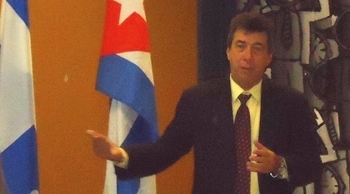
Outaouais, October 21, 2011
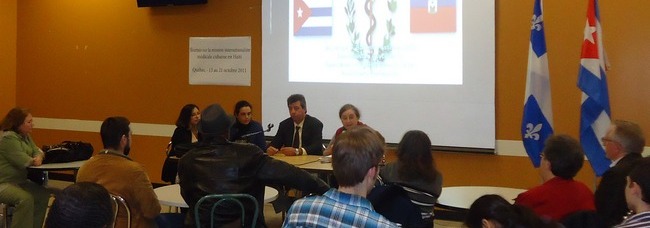
TML Daily, No. 118, November 23, 2011
From October 13 to November 6, Cuban doctor Jorge Tomas Balseiro Estevez toured 14 cities across Canada and Quebec informing of Cuba's humanitarian internationalism around the world and especially in Haiti, where he was posted following the January 2010 earthquake. He was accompanied by Sandra Ramirez Rodriguez, a representative of the Cuban Institute for Friendship with the Peoples (ICAP). During the tour, Dr. Balseiro spoke with people from all walks of life, including youth and students, workers and medical professionals about Cuba's work in Haiti and the spirit that guides it. Wherever he spoke, Dr. Balseiro was received with great enthusiasm and people expressed their appreciation and respect for Cuba's work internationally. He was given an especially warm reception by members of the Haitian diaspora who conveyed their profound appreciation for Cuba's assistance to their homeland.
The tour was organized by the Canadian Network on Cuba and its member organizations across Canada and in Quebec by the Table de concertation et de solidarité Québec-Cuba as part of the Cuba for Haiti Campaign. The campaign was launched after the devastating earthquake that hit Haiti January 12, 2010, expressing confidence in Cuba's mission in Haiti, which began in 1998, following Hurricane Georges. As of November 5, the Cuba for Haiti Campaign has received $398,248.42, all forwarded to the Cuban Medical Brigade's work in Haiti.
Breadth and Depth of Cuba's Selfless Humanitarianism
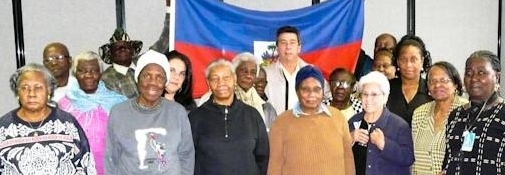
With members of the Haitian community in Montreal, October 16, 2011.
In his presentations, Dr. Balseiro provided the background for Cuba's presence in Haiti. He recounted how in 1960, shortly after the Revolution, Cuba sent a brigade to Chile in the aftermath of an earthquake. Building on this and each subsequent experience, Cuba sent medical missions to Africa and Central America during the 1970s and 1980s. Today, Cuba is assisting 48 countries with health projects, while more than one-fifth (22 per cent) of its doctors are posted outside the country.
Over the last 50 years, Cuba has sent 1.1 million medical personnel to 97 countries. This figure includes 375,000 personnel sent to nine European countries; 8,200 to 17 countries in Asia and Oceania; 6,500 to 37 countries in the Americas; and 3,600 to 37 African countries. All of this has been done despite the many challenges Cuba itself faces, including the U.S. attempts to isolate it and destroy its Revolution through a criminal blockade and terrorist attacks.
It is important to note that wherever Cuba sends its personnel, medical or otherwise, it always upholds the highest principles of international relations. Its missions are always conducted under the supervision of local authorities, in respect of the culture, history and thinking of the people of the countries it assists.
The Medical Mission in Haiti
As Dr. Balseiro explained, Cuba's presence in Haiti was well-established before the January 2010 earthquake as a humanitarian brigade was first sent to Haiti after Hurricane Georges, a natural disaster that resulted in 230 deaths, the destruction of 80 per cent of the crops and which left 167,000 people homeless. At that time, nothing was in place for the medical brigade and all the basic infrastructure had to be established. Cuban medical personnel have been in Haiti ever since, assisting and building the infrastructure required by the Haitian people to become self-sufficient for their health care needs.
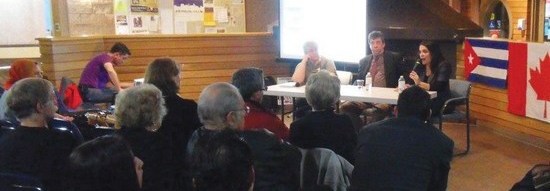
Calgary, October 26, 2011
Less than a week after the earthquake struck, Dr. Balseiro arrived in Haiti on January 16, 2010 as part of the emergency response. In short order, the Cubans established a field hospital on the ruins of a school and soon provided emergency care, an intensive care unit, an operating theatre, outpatient care, an x-ray facility, clinical laboratory, equipment sterilization and more. Dr. Balseiro, a psychiatrist, led a team made up of a surgeon, an orthopedist, an anesthetist, a gynecologist, pediatrician, psychologist, nurses, lab technicians, an epidemiologist and a rehabilitation technician.
During the four months he was stationed in Haiti, Dr. Balseiro provided various forms of psychiatric care to Haitian children and youth suffering from the trauma and shock of the earthquake. These children and youth had severe injuries, had lost parents or other close relatives and had seen their surroundings fall around them in the earthquake. The Cuban medical personnel had to be creative, he said, to deal with a traumatized population in a situation with very limited resources. Members of the Cuban brigade undertook an extensive daily program that included games, simulation exercises, therapy groups and singing, so as to help these young people overcome their trauma and rise to meet the future. Most importantly, the team trained local Haitians, who know the children in their community, to carry out activities to assist the children in the wake of the earthquake and its related post-traumatic stress.
One of the most difficult periods Dr. Balseiro explained, was the cholera epidemic that followed a few months after the earthquake. Nevertheless, the Cuban medical brigade overcame the difficulties of their limited supplies and successfully treated thousands of people, saving an untold number of lives.
Cuba was also uniquely placed to assist Haiti because of the large number of Haitian medical students enrolled, free of charge, at the Latin American School of Medicine (ELAM) in Havana. Haitian students in their fifth year of studies at ELAM were an important component of the brigades, providing not only medical care but Creole translation and vital knowledge of the people and country.
Breaking the Silence on Cuba's Humanitarianism
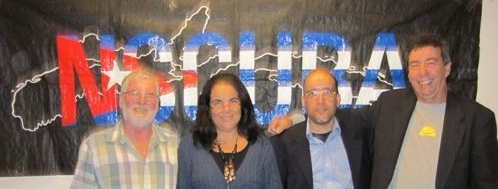
Dr. Balsiero and Ms. Ramirez in Halifax, October 19, 2011, with members of the Nova Scotia Cuba Association, including Isaac Saney, Canadian Network on Cuba Co-Chair and National Spokesperson (second from right).
The important assistance Cuba renders everyday to the peoples of the world is very well-known by those who receive the assistance. However, even in the normal course of reporting on events, the monopoly media is deliberately silent on Cuba's humanitarianism. This attempt to hide or distort the profound humanitarian character of the Revolution was an issue raised at various stops during Dr. Balseiro's tour.
Dr. Balseiro's tour and the broad participation in the events are important contributions to breaking the silence on what Cuba is really like. At a time when the imperialists are committing the most heinous war crimes in Libya, Afghanistan and elsewhere in the name of "humanitarianism," Cuba's assistance to Haiti stands as a model of international relations based on the respect of sovereignty and an indictment of "humanitarian interventions" and the "responsibility to protect" doctrine.
To find out more about the Cuban for Haiti Campaign, contact:
Keith Ellis, Canadian Network on Cuba, Coordinator of Cuba for Haiti
Phone: 905 822-1972
Email: zellis@yorku.ca
Isaac Saney, Canadian Network on Cuba, Co-Chair and National Spokesperson
Phone: 902-449-4967
Email: isaney@hotmail.com
To contribute directly to the Cuba for Haiti Campaign, make cheques out to "The Mackenzie-Memorial Fund", indicating on the cheque memo line "Cuba for Haiti" and mail to:
Mackenzie-Papineau Memorial Fund & Friends of the Mac Pap Battalion (International Brigades), Attention: S. Skup, 56 Riverwood Terrace, Bolton, ON L7E 1S4.
